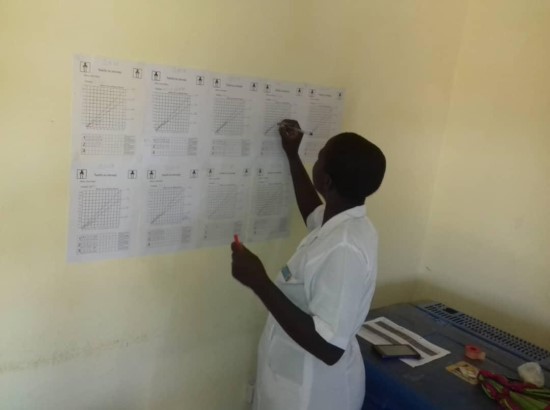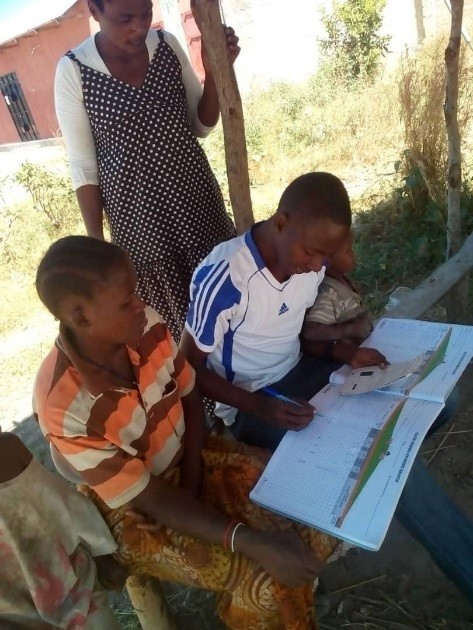Tabora Region, Tanzania – “Our aim is to reach every child with vaccinations and to ensure that we are safe from vaccine-preventable diseases,” said Dr. Boniface Yombo.
Given that Tanzania has maintained good coverage levels nationally, Dr. Yombo’s goal may sound easily reached. After all, the Pentavalent 3 vaccine coverage rate (a proxy for immunization coverage) has remained at 90% nationally for more than 10 years.
In 2014, however, when Tanzania introduced the second dose of the measles vaccine (MCV 2) to its routine immunization schedule, the national MCV 2 coverage rate only reached 29% by the end of the year. Though national MCV 2 coverage has improved steadily since then – reaching 79% in 2016 – it remains low relative to other routine immunizations. It also varies highly between and within regions and councils.

Tabora Council in western Tanzania, for instance, struggled with MCV 2 coverage rates that were lower than the national average. In 2017, when the national MCV 2 coverage rate was 79%, Tabora’s coverage rate was 65%. Tabora District’s Medical Officer, Dr. Yombo aims to do better.
In response, MCSP worked with stakeholders at multiple levels of the health system, assisting the local government to improve planning for vaccine delivery, and developing multiple strategies to try to raise and maintain Tabora’s MCV 2 coverage rate. By supporting local planning and the design of community registers – coupled with supportive supervision and data review meetings – MCSP enabled the Tabora District team to achieve their own goal: significant increases in coverage.
“MCSP helped us improve our health facilities’ performance by strengthening our planning, implementation and monitoring skills, and helping us prepare better micro plans with required resources,” said Vitus Ntega, Tabora’s Municipal Immunization and Vaccine Officer. These resources include outreach and mobile allowances; distribution, procurement and refilling of liquefied petroleum gas cylinders; and vaccine forecasts – all of which are now reflected in the Comprehensive Council Health Plan (CCHP).
This micro plan guides immunization activities, specifically, and feeds into the national CCHP, which comprises all health activities. “Based on the micro plan, Tabora is now implementing active defaulter tracing at the community level using community registers developed with support from MCSP,” Ntega added.
The community register is officially known as the “My Village My Home” (MVMH) tool, which MCSP has used successfully in numerous countries to mobilize families for immunization, and to monitor the immunization status of children to improve utilization of services and reduce defaulters. The tool – a large poster in the shape of a house – contains the name of every child in the community. When a child is immunized, a square (or “brick”) is filled in – illustrating that a strong community, like a strong house, is built one healthy member at a time.

“With the register, I have the names and vaccination records of all eligible children in my catchment area, and it is very easy to identify who is due for certain vaccines and to follow up with their parents and caretakers to ensure they take the children for vaccination,” said Ramadhan Shaban, a community health worker (CHW) from Tabora. “Currently, I have been tasked by my health facility in-charge to identify all children ages 18-24 months old who have missed the MCV 2 vaccine. I share these names with the health facilities and I will follow up with house-to-house visits to make sure every eligible child receives the service in the outreach or fixed site sessions.”
With MCSP support, activities within Tabora Council health facilities have also strengthened. In 2017, the Tumbi Dispensary – which serves more than 400 children aged 1-5 – had one of the lowest MCV 2 coverage rates in the region, at 31%. By 2018, that number had increased to 148% as a result of defaulter tracing and identifying children to vaccinate above the target. (This number exceeds 100%, because the Dispensary was able to trace defaulters that were not captured in original targets due to changes in national census calculations.)

“Initially, I was not aware of how big the problem of children missing or not completing immunization was,” said Regina Kimwaga, the Reproductive and Child Health (RCH) In-Charge at Tumbi Dispensary. “When I attended the Immunization in Practice and Reaching Every Child trainings [delivered by MCSP and the Ministry of Health], and after I participated in several data review meetings supported by MCSP, I learned a lot. I realized that I have a very big role to play to ensure that all children in my catchment area receive their vaccinations on time.”
Now, Kimwaga said, her priorities are all related to increasing coverage rates: ensuring immunization services are provided every day at the health facility; planning and conducting outreach activities; paying health workers and CHWs allowances for providing outreach services; and budgeting for electricity bills and procurement of gas cylinders. “I had a discussion with my team at the health facility and we have also agreed to do active defaulter tracing, focusing on children who missed their MCV 2 dose,” she added.
Indeed, Dr. Yombo’s enthusiasm and commitment to the goal of increased coverage transcends his entire team. “Immunization is one of the most important and cost-effective interventions that the government is providing to children and pregnant women,” he said.
Best of all, by conducting active defaulter tracing for children under the age of 2 years who have missed MCV 2, the team is also identifying children who have missed other vaccines. “We are working very closely with health facilities, CHWs, and our partners to ensure that all children are reached with all vaccines per the national immunization schedule,” Dr. Yombo said.
By building the capacity of health care workers and CHWs, MCSP is helping communities in four Program-supported regions of Tanzania to reach their own immunization goals. With MCSP training under his belt and supervision at the ready, Dr. Yombo confidently declared: “I am sure we can accomplish this.”
